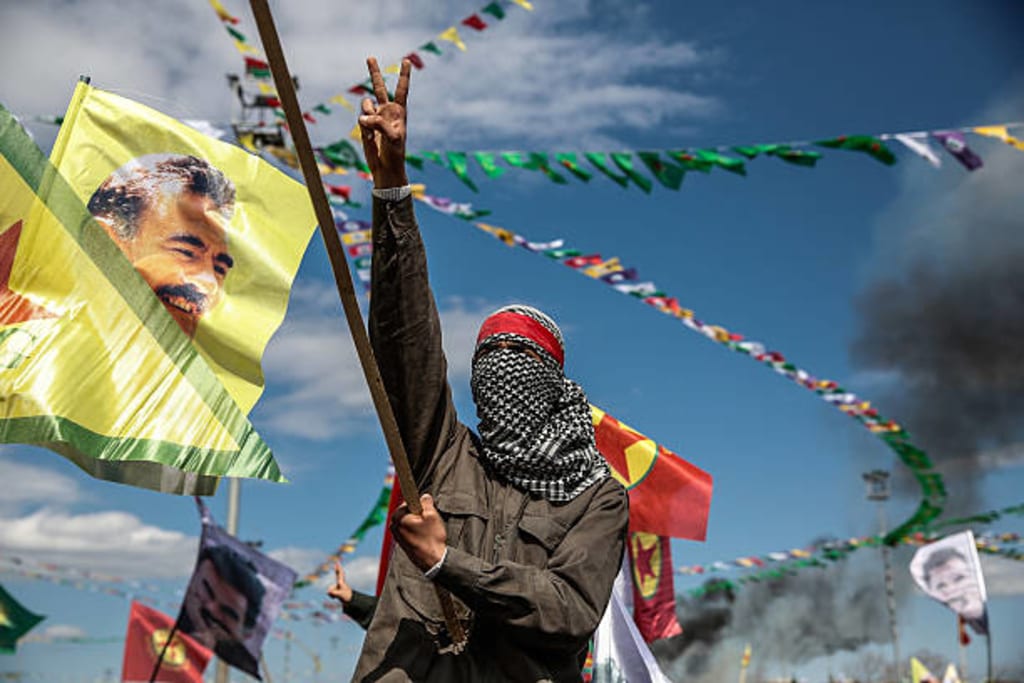PKK Claims Responsibility for Ankara Suicide Attack: Turkey Condemns Terrorism, Vows Resilience
politics

Sadly, the Kurdistan Workers' Party (PKK) has taken credit for a suicide bombing that happened close to the Ankara office of the Turkish Interior Ministry. The current attack has caused shockwaves throughout the capital and has prompted outrage from both domestic and foreign sectors.
According to a report from ANI citing Al Jazeera, the suicide attack was witnessed by CCTV footage that Reuters received close to the Turkish Interior Ministry. The video showed a car pulling up to the ministry's front gate and one of the passengers quickly making their way toward the building before being hit by an explosion. The second occupant stayed out on the street. One of the attackers was killed in the explosion, while the Turkish interior minister stated that the other assailant was "neutralized" or killed by the authorities. Ankara's cabinet offices and the adjoining parliament are located in a key district that was shaken by the occurrence.
The PKK claimed responsibility for the incident in a statement sent to the ANF news agency, calling it a "sacrificial action" carried out by a group from their Immortal Brigade. The incident was described as a "suicide attack" that was purposefully timed to coincide with the inauguration of parliament by ANF News, a source well-known for its close ties to the PKK militant group.
Two police officers were hurt in the explosion, according to the interior minister of Turkey, thankfully with non-life-threatening wounds. NATO Secretary-General Jens Stoltenberg strongly denounced the attack on social media, expressing solidarity with Turkey in its battle against terrorism and wishing the injured police officers a speedy and complete recovery.
Stoltenberg stressed that "NATO stands in solidarity with Turkey in the fight against terrorism," underscoring the alliance's dedication to helping members who are facing security issues.
In a speech to the Turkish parliament, President Recep Tayyip Erdogan addressed the incident, branding the perpetrators "terrorists" and assuring the populace that they would not succeed in their goals in Turkey. Erdogan called the attack the "last flutters of terrorism" and reiterated that terrorists trying to undermine public safety and peace will fail.
According to Erdogan, who was quoted by ANI via Al Jazeera, "Today's terrorist act in Ankara, in which two criminals were neutralized thanks to the prompt intervention of police, is the last flutter of terrorism." He further cautioned that fostering "terrorist" groups' morale with political motivations would be a formidable challenge.
The PKK and the Turkish government have a protracted history of confrontation. The PKK is regarded as a terrorist group by Turkey, the US, and the EU. The group, which has long engaged in guerrilla warfare and terrorist acts, wants autonomy for Turkey's Kurdish-majority provinces.
The attack's timing, which coincided with the start of parliament, emphasizes the symbolic impact of such terrorist operations. Terrorist organizations seek to spread fear, sabotage governance, and undermine the legitimacy of the state by attacking government buildings and other symbols of authority. The PKK's admission of guilt complicates matters further by escalating tensions in an already unstable region.
Turkey is at a crossroads in its response to the attack, balancing the need to handle internal security risks with managing the geopolitical ramifications of the PKK's assertion. NATO's solidarity in expressing the outrage of the world community highlights the joint commitment to the global fight against terrorism.
The Turkish government is determined to uphold order and defend its citizens, as seen by President Erdogan's firm stance against terrorism and his confidence that the assailants will not be successful in disrupting Turkey. The tragedy also calls into question the need for a thorough and long-lasting resolution to the Kurdish conflict and the ongoing effort to address its underlying causes.
The importance of counterterrorism measures, intelligence collection, and regional stability becomes vital as Turkey deals with the fallout from this incident. In addition, there is an increasing need for diplomatic efforts to address the root causes of the conflict and create a climate that is favorable to dialogue and peaceful coexistence.
In conclusion, the recent suicide assault in Ankara and the PKK's subsequent admission of guilt have once again highlighted the difficult obstacles Turkey must overcome in order to uphold security and stability. The worldwide community's censure and NATO's show of support highlight how linked global security is and how fighting terrorism is a shared responsibility. As Turkey deals with the effects of this attack, a comprehensive strategy that covers both immediate security concerns and the underlying causes of the conflict remains imperative.





Comments (1)
Great work! Sad what happened though! Well written!